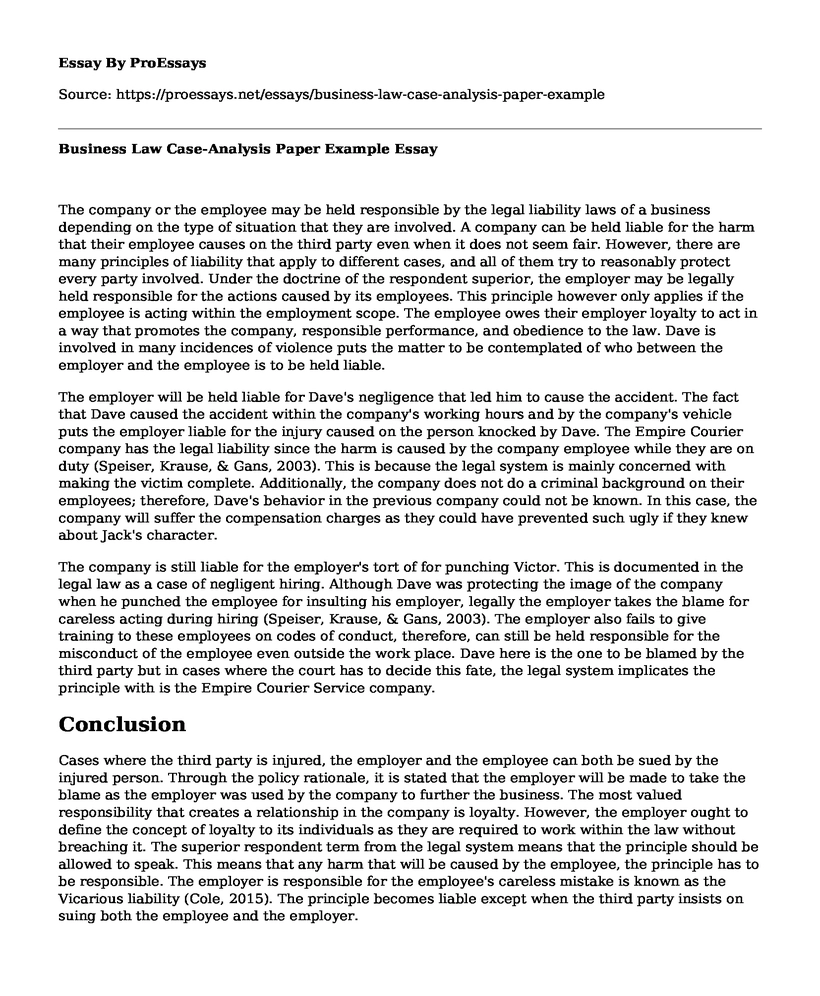The company or the employee may be held responsible by the legal liability laws of a business depending on the type of situation that they are involved. A company can be held liable for the harm that their employee causes on the third party even when it does not seem fair. However, there are many principles of liability that apply to different cases, and all of them try to reasonably protect every party involved. Under the doctrine of the respondent superior, the employer may be legally held responsible for the actions caused by its employees. This principle however only applies if the employee is acting within the employment scope. The employee owes their employer loyalty to act in a way that promotes the company, responsible performance, and obedience to the law. Dave is involved in many incidences of violence puts the matter to be contemplated of who between the employer and the employee is to be held liable.
The employer will be held liable for Dave's negligence that led him to cause the accident. The fact that Dave caused the accident within the company's working hours and by the company's vehicle puts the employer liable for the injury caused on the person knocked by Dave. The Empire Courier company has the legal liability since the harm is caused by the company employee while they are on duty (Speiser, Krause, & Gans, 2003). This is because the legal system is mainly concerned with making the victim complete. Additionally, the company does not do a criminal background on their employees; therefore, Dave's behavior in the previous company could not be known. In this case, the company will suffer the compensation charges as they could have prevented such ugly if they knew about Jack's character.
The company is still liable for the employer's tort of for punching Victor. This is documented in the legal law as a case of negligent hiring. Although Dave was protecting the image of the company when he punched the employee for insulting his employer, legally the employer takes the blame for careless acting during hiring (Speiser, Krause, & Gans, 2003). The employer also fails to give training to these employees on codes of conduct, therefore, can still be held responsible for the misconduct of the employee even outside the work place. Dave here is the one to be blamed by the third party but in cases where the court has to decide this fate, the legal system implicates the principle with is the Empire Courier Service company.
Conclusion
Cases where the third party is injured, the employer and the employee can both be sued by the injured person. Through the policy rationale, it is stated that the employer will be made to take the blame as the employer was used by the company to further the business. The most valued responsibility that creates a relationship in the company is loyalty. However, the employer ought to define the concept of loyalty to its individuals as they are required to work within the law without breaching it. The superior respondent term from the legal system means that the principle should be allowed to speak. This means that any harm that will be caused by the employee, the principle has to be responsible. The employer is responsible for the employee's careless mistake is known as the Vicarious liability (Cole, 2015). The principle becomes liable except when the third party insists on suing both the employee and the employer.
References
Cole, J. (2015). Agency-Vicarious Liability-Abrogation of the Both Ways Rule. DePaul Law Review, 16(2), 478.
Speiser, S. M., Krause, C. F., & Gans, A. W. (2003). The American law of torts (Vol. 1). Lawyers Co-operative Pub. Co..
Cite this page
Business Law Case-Analysis Paper Example. (2022, Oct 03). Retrieved from https://proessays.net/essays/business-law-case-analysis-paper-example
If you are the original author of this essay and no longer wish to have it published on the ProEssays website, please click below to request its removal:
- How to Improve Employee Motivation Report Essay
- Space Shuttle Challenger Disaster: Professional, Ethical and Moral Issues Essay
- Ethical Arguments About Marketing Essay Example
- Incivility in the Work Place Essay Example
- Motivating Skills for Academic and Business Success - Essay Sample
- Essay on Lack of Diversity and Inclusion at Yelp: Impacts on Performance and Market Share
- Essay Example on Gender Inequality in the Workplace: The Unfortunate Reality







